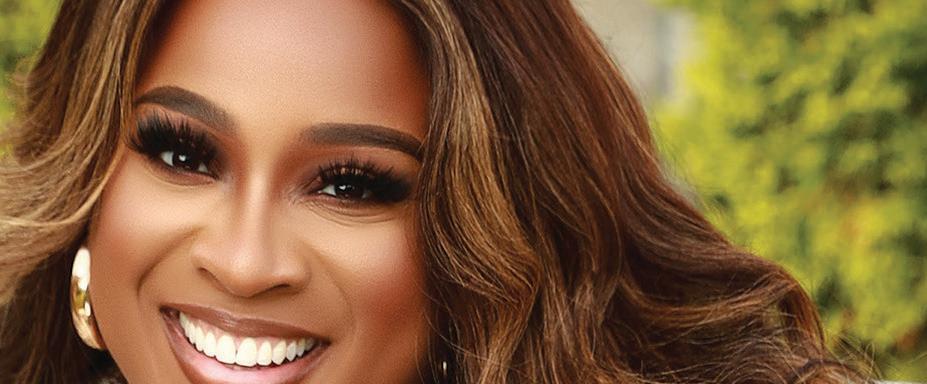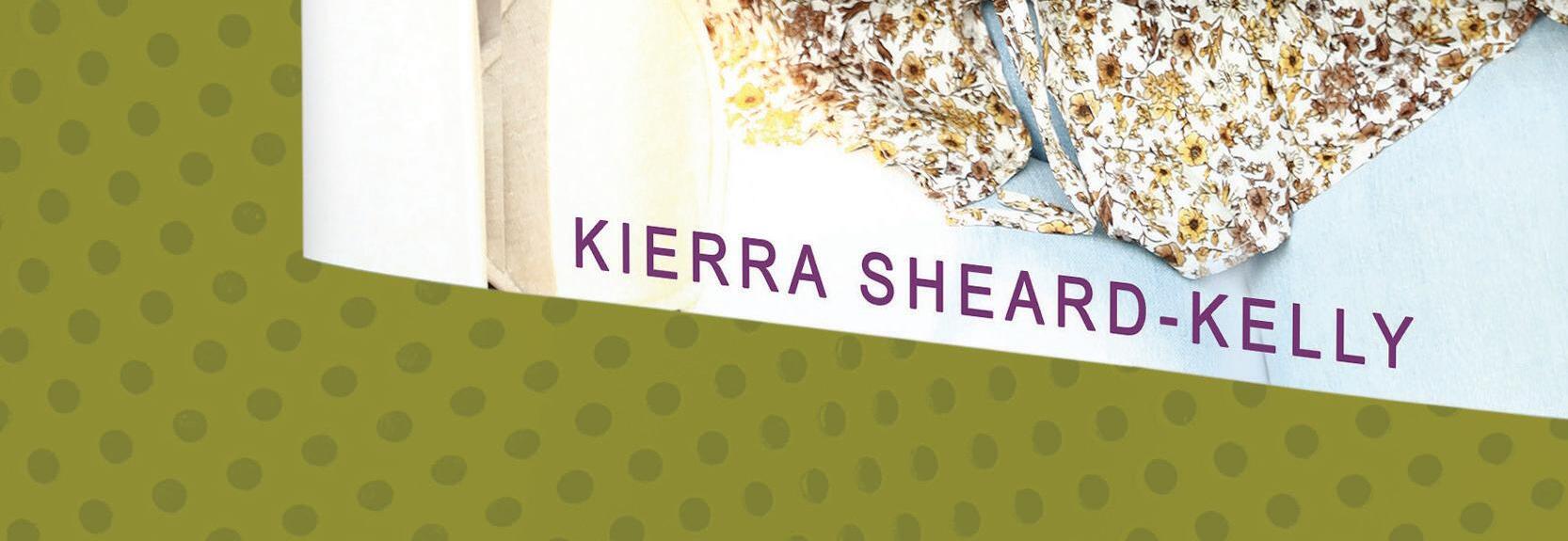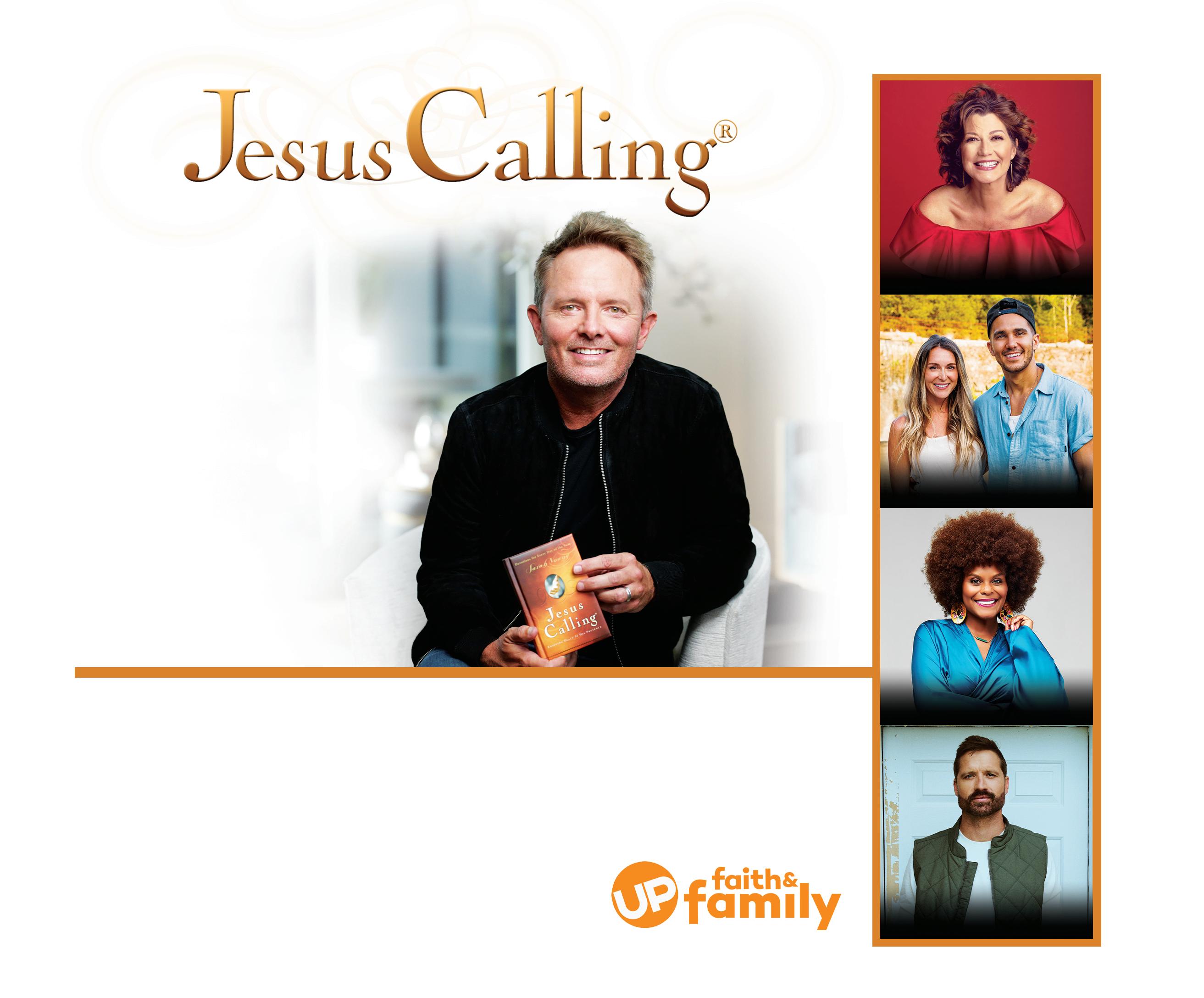GOLFER BUBBA WATSON
Winning Over Anxiety ANCESTRY’S




DEB LIU

Connecting to Your History
CREATE YOUR OWN SPRING CONTAINER
GARDEN
SPRING 2023 FREE
® MAGAZINE
NEW FAITH, NEW PERSPECTIVE





See something you like in the magazine? Most titles featured in this publication are available at our retail partners: Save when you buy in bulk at churchsource.com/jc 800-727-3480 store.faithgateway.com 800-834-7828
Bloom




this Spring with Jesus Calling Books!















Dear Reader,
I love Jesus’ beautiful invitation: “Come to Me, all who are weary and burdened, and I will give you rest” (Matthew 11:28). This precious promise assures us that Jesus listens to our prayers and He is in control—even when our circumstances seem completely out of control.
Many years ago, I went to Covenant Theological Seminary to work on a master’s degree in counseling and biblical studies. One of my favorite classes was a course on the Bible’s wisdom literature. The professor taught us many wonderful things, but there was one simple teaching that has stayed with me all these years. He shared with the class his personal practice of praying “Help me, Holy Spirit” throughout the day. He encouraged us to pray this way too. I followed my teacher’s advice until this brief prayer became a part of me. Now I find myself praying it effortlessly, and it reminds me that I am never alone—the Holy Spirit is always available to help me. If you belong to Jesus, His Spirit is always available to help you too!
The response from many of you to my prayer request about cancer treatment has been very encouraging! Knowing that you’re remembering me in your daily prayers blesses me and carries me through difficult times. My doctor has told me that my journey through this treatment will be long. She says it’s a marathon, not a sprint. Thank you so much for supporting me through your prayers!
I continue to keep all of you in my prayers.




 Jesus Listens
Jesus Always Note-Taking Edition
AVAILABLE MAY 9
Jesus Calling with Real-Life Stories
Jesus Listens for Kids
PHOTO BY JEREMY COWART
Jesus Listens
Jesus Always Note-Taking Edition
AVAILABLE MAY 9
Jesus Calling with Real-Life Stories
Jesus Listens for Kids
PHOTO BY JEREMY COWART












CONTENTS SPRING 2023 THE ® MAGAZINE COVER STORY | 8 Danica McKellar on Her Light-Switch Moment and New-Found Faith Bubba Watson | 14 Laura Minchew SVP & Group Publisher Michael Aulisio VP & Publisher Editor-in-Chief Robin Richardson Senior Marketing Director Mandy Wilson Marketing Director Stephanie Chalk Senior Marketing Manager Laura Neutzling Managing Editor Amy Kerr Senior Editor Abigail Nibblett Content Coordinator Barbara Moser Creative Director Peter Ackerman Senior Operations Manager Michelle Lenger Designer Published quarterly by Thomas Nelson, Inc. P.O. Box 141000 Nashville, TN 37214 Printed in the U.S.A. © 2004 Sarah Young All rights reserved; no materials may be reproduced in any form without the express written permission of the publisher. The Jesus Calling Magazine is not responsible for problems with vendors or their products or services. Cover photo by GAC Family, iStock For advertising inquiries, visit JesusCalling.com/magazine Natalie Grant | 35 Deb Liu | 32 3 Jeanne Celestine Lakin: Forgiveness Can Heal Our Deepest Wounds 6 Doing Good: Advice from “The Internet’s Dad,” Rob Kenney 12 Lil’ Mike & Funny Bone: Using What You Have to Inspire Others 14 PGA Champ Bubba Watson: “We All Need Someone to Talk To” 16 A Jesus Listens Prayer to to Remind You of God’s Unfailing Love 17 Pastor’s Corner: Jonathan Pitts on Weathering the Storm with Your Faith Intact 18 Hayley Arceneaux: From IV Drips to Rocket Ships 20 Plant a Container Victory Garden Perfect for Spring 22 MLB Pitcher Luke Weaver: What Happens After You Reach You Dreams? 25 Seth & Heather Thompson Day on the Hard Work of Showing Up 28 A Heart to Serve: Celebrating Our Service Members 30 Hallmark Actress Nikki DeLoach on God’s Surprising Path for Her 32 Ancestry’s Deb Liu: Turning Unbelonging into a Mission of Connection 34 Jesus Listens: Stories of Prayer: Kym Douglas on Beauty That Shines in the Dark 35 Music Spotlight: The Miracle Natalie Grant Didn’t Expect 36 Hootie & the Blowfish Drummer Jim Sonefeld’s Daily Hope 38 Amy Hannon’s Hospitality Motto: Love. Welcome. Serve. 40 Springtime Games & Puzzles
Rwandan Genocide Survivor
 Jeanne Celestine Lakin
by Cynthia M. Stuckey
Jeanne Celestine Lakin
by Cynthia M. Stuckey
How God Works in the Midst of Darkness
IMAGES COURTESY OF ANTHONY RATHBUN FOR HOUSTONIA MAGAZINE, JEANNE CELESTINE LAKIN; ISTOCK
IN EARLY APRIL 1994 , the sun beat down upon Rwanda while the deep brown eyes of an eight-yearold girl peeked out from dense bushes. Watching, waiting, heart pounding.

This was no game of hide-and-seek with her siblings. Instead Jeanne Celestine Lakin was trying to stay alive. Her parents, prominent and generous business owners, were suddenly homeless and in perilous danger. Steps away, their own neighbors were among the machete-yielding militia sanctioned by the government to exterminate Jeanne’s family and many other Tutsi people.
All at once, the Rwandan Genocide had begun, a massacre that would take nearly one million lives in one hundred days, for no other reason than their ethnicity. In the days that followed, Jeanne lost both of her parents and nearly all of her family to incomprehensible violence. She would be trafficked, abused, and eventually immigrate to the United
States at the age of fourteen, only to find herself with an abusive foster family. Such a horrific childhood would surely leave gaping wounds which would never heal, but that is not the story this hope-filled survivor tells.
With quiet strength, Jeanne shares how she saw God in the midst of genocide. More importantly, she tells of how He saw her. Each time she was in danger of being killed, she narrowly escaped after praying that God would blind the people trying to kill her. She was inexplicably set free again and again. “I started praying a simple prayer: ‘God, blind them. Blind these men and women with machetes. Blind these people, that they might not see me. I know they can see me, God. But You have a way of working miracles.’ I went back and counted how many times God revealed Himself to me in this way. It was over 200 times. God was working on my behalf. He was working in the midst of this darkness.”
4
The Kigali Genocide Memorial Walkway in Kigali, Rwanda
The knowledge that God both saw and held her would be Jeanne’s constant companion in the years ahead, as much sorrow was still in her path. She would be kidnapped and sexually abused many times. She was nearly sold as a child bride. But in the midst of relentless tragedy, she still saw the hand of her God. “He has a way of working, even when we don't feel like it. He’s a God who sees. He sees details we might not see.”
but opened the door for her to lead a full and joyfilled life. Twenty-nine years later, Jeanne is now a sought-after speaker, author, and orphan advocate in Houston, Texas. She and her husband Paul, together with their son, Samuel, are living a life that sparkles with redemption and the goodness of God. She speaks for all who hear her story when she says, “God takes these pieces that are just so broken, that we as humans cannot put together, and just creates beauty out of ashes. He puts these pieces into a beautiful mosaic that we get to admire.”
Six months after the genocide ended, long before her healing began, Jeanne remembers feeling devastated, gutted. “I was so lonely, so depressed, so sad because of all I had just witnessed. But I wanted to be able to forgive these people. I wanted to let go of what happened to me and be normal. But I couldn’t get myself to forgive what had happened.” Accepting her limits, she put the great burden of forgiveness in God’s hands. “I said to Him, ‘God, I need Your help. I need You. I cannot do this by myself. Give me the strength to do this.’”
In surrender, Jeanne found that God did indeed give her the capacity to forgive. “I felt so much peace in my heart. I felt like there was this possibility that opened for me, this potential I felt I could never reach. It’s all because of the love of God that we can fully experience joy.”

Though forgiveness began to provide the freedom Jeanne hoped for, she admits that it was a process where she constantly submitted her pain into the Lord’s hands. “Forgiveness is not a one-time act. Forgiveness is an ongoing act. So we forgive seventyseven times seven, and we have to continue to forgive and forgive. Many times we don't have what it takes to forgive. We ask God to give us the ability to be able to do this because it's not up to us.”
Jeanne admits this deliverance not only freed her from the weight of what she had endured,

5 Adapted for print from the Jesus Calling Podcast. Put your phone in Camera mode and hover over this code to hear more of Jeanne’s miraculous story.
“
Forgiveness is not a one-time act. Forgiveness is an ongoing act.
To learn more about Jeanne and how she’s using her story to help other, visit avoiceinthedarkness.org.
Jeanne with her husband Paul, and son Samuel
ROB KENNEY






“THE DAD OF THE INTERNET”




WANTS YOU TO KNOW YOU ARE LOVED
by Laura Neutzling


EVER WANTED TO KNOW HOW to tie a tie? Change your oil? File

your taxes?
Maybe someone taught you these things. Someone who’d walk you through basic life skills and impart their wisdom along the way. Maybe it was your mother, your father, or a trusted family friend.
But what if you didn’t have a person like that in your life? Sure, you can easily find a DIY video to give you the basics on just about anything you need to know. But would that video make you feel any less alone? Would that DIY have something special that speaks to you the way a parent would, or a trusted friend?






Rob Kenney has made it his mission to fill the gap for many, who maybe didn’t have that special person to help them navigate life. And he does it with a balance of practical advice, encouragement, and even prayer.
Rob’s father left their family and his seven siblings when he was fourteen years old. Being the oldest, Rob was heartbroken to see his younger siblings without a dad around to help them figure out basic practical skills, as well as the emotional things, the stuff many of us have relied on our dads to model to us.
Rob felt this missing piece for a long time. But it wasn’t until he became a father himself that he decided he could fulfill the wish he’d always had for his siblings: to be a voice and a trusted friend people could come to if they had questions, or needed encouragement, or were missing a fatherly presence in their life.
That’s when Rob decided to start a YouTube channel.
“I was just trying to help thirty or forty people when I started—I thought I’d download the information from my head to people who needed it. So what it’s become has been beyond me, but I give credit to God for giving me this platform, to be able to share His love with people.”
Those “thirty or forty” people Rob was trying to help has turned into more than 4 million subscribers on Rob’s “Dad, How Do I?” YouTube channel, where each month he gets millions of views on his how-to and inspirational videos. From teaching people how to shave, to caring for a lawn, to working with tools, to simple cooking tips, Rob is there with a smile, some encouragement, and an inspirational word to help others navigate life. He also hopes along they way, they feel like they’re being seen, heard, and taken care of.

“I’m grateful for the platform,” Rob says, “but the flip-side is that it






breaks my heart how much it’s needed. To hear the stories of how people have never heard the words ‘I’m proud of you, I love you, I’m praying for you.’ There’s just so much hurt out there.”
Rob knows there’s so much more to being a dad than fixing things around the house or showing your kids how to fish. The key to Rob’s beloved status as “The Dad of the Internet” is that he shares his heart. And in a world where we often don’t know who to trust, Rob is a light for people who are looking for a friend to ask that simple question, “Dad, how do I?”
Adapted for print from the Jesus Listens: Stories of Prayer YouTube series. Watch Rob tell his story now! Just put your phone in Camera mode and hover over this code.

You can find Rob’s book Dad, How Do I? wherever books are sold.

DOING GOOD IMAGE COURTESY OF ALLISON FANN
“
I’m grateful for this platform, but on the flip-side, it breaks my heart how much it's needed.
“IT WAS ALWAYS YOU”


Actor Danica McKellar’s Light-Switch Moment of New-Found Faith




 by Amy Kerr
by Amy Kerr


IT’S








FUN TO CATCH UP with an old friend, especially if you haven’t seen each other in a while. There’s something special about spending time with people you knew when you were younger, a lifetime ago when you had different interests and fewer (much fewer) responsibilities. You remember so clearly who you were back then. You can’t help but compare the memories of who you were to the grown people you are now.
In this case, that “friend” you’re meeting up with? It’s Danica McKellar.
You don’t know each other, not really. But you feel like you know her, because like so many in the late‘80s and early-‘90s who watched Winnie Cooper on The Wonder Years, you feel like you grew up together.

And she really does seem like an old friend. She’s warm and kind, just like you thought she would be. But there’s a hint of something you weren’t quite expecting, something that makes a smile spread across your face as you listen to her.
Danica McKellar is incandescently happy. Joyful, even.
And it makes you joyful too.
“I have this connection to true peace, no matter what’s going on in the world” she says. “I am so excited about this newfound relationship and connection I have with Jesus. I’m just so grateful.”
Good for you, Danica, you think. Just as you would for a friend.
backdrop of the turbulent 1960s and ‘70s. Danica instantly won viewers in her portrayal of Winnie Cooper, Kevin’s intelligent, good-natured girlfriend. After only six episodes, the show won the 1988 Primetime Emmy Award for Outstanding Comedy Series, along with a Peabody Award for “pushing the boundaries of the sitcom format and using new modes of storytelling.” Popular with Baby Boomers who vividly remember their own “Wonder Years” of the ‘60s and ‘70s, along with Gen-Xers and Millennials who watched the series when they were adolescents along with the characters, The Wonder Years became, and remains, a cultural phenomenon.
In her early years, Danica and her younger sister Crystal grew up near San Diego, California, with dad Christopher, a real estate developer, and mom Mahaila, who owned a dance studio. When Danica was eight, Mahaila enrolled the girls at the Lee Strasberg Theatre & Film Institute in Los Angeles (Sally Field, Barbra Streisand, Chris Evans, and Jon Leguizamo are just a few notable alums). A year later, an agent saw Danica and Crystal perform and offered to sign them, and soon after, the girls began auditioning.
And in 1987, Danica landed a role on a new, genre-bending television series: ABC’s The Wonder Years. The show tells the coming-of-age story of middle schooler Kevin Arnold, set against the
I credit my parents for keeping me so grounded.

Going from a normal twelve-year-old to a critical darling could’ve sent Danica down a darker path of some child stars before her. But the actress walked through her new season a bit differently.
“I credit my parents for keeping me so grounded,” says Danica. “The priorities were clear: health, family, education. I never went to Hollywood parties. I didn’t even take jobs in the summer; we would go on family vacations. Acting was just this fun hobby.”
9 IMAGES COURTESY OF DANICA MCKELLAR'S INSTAGRAM,
CATHRYN FARNSWORTH; ISTOCK
COVER STORY
“
Danica and co-star Fred Savage as characters "Winnie" and "Kevin" in ABC's The Wonder Years
When the show ended in 1993, eighteen-year-old Danica enrolled at UCLA, eager to begin the next phase of her life and establish who she was outside of her iconic role. “In some ways, math saved me, because I wound up with this whole other identity,” she said in a 2017 conversation with The Wall Street Journal


And find it, she did. On her way to earning a summa cum laude degree in mathematics from UCLA in 1998, Danica co-authored a groundbreaking mathematical physics theory, which is named in part for her: the Chayes-McKellar-Winn Theorem.






“Little girls are told, ‘You’re so cute, you’re so pretty, look at that pretty dress.’ They’re not usually told, ‘Look how smart you are.’ You can have both. You can be smart, play with fashion, be a glam girl— there’s no contradiction,” she said to Forbes in 2016.






Over and over, Danica proved she could have both. And throughout the next decade, she began to advocate for more women and girls to participate in STEM activities. In 2000, Congress invited Danica to speak on the importance of women in math and science. She wrote a series of math books for middle and high school girls, turning the social conditioning of “girls can’t do math” right on its head. All the while, she steadily worked in television, starring in recurring roles on The West Wing and How I Met Your Mother along with dozens of guest spots on other series. She even made time for family, welcoming son Draco in 2010. Still she wrote. Still she took acting jobs.
Somewhere along the way, when Danica was in her twenties, her father Christopher found a new identity, too: as a Christian.




“He suddenly had this amazing relationship with Jesus, and he would try to tell me about it. He gave me a cross to wear. I was like, ‘Wow, that’s great!’ I was so happy for him, because it was something that was making him so happy. But it didn’t really connect with me at the time.”



The change was profound, especially since religion wasn’t a big part of her household growing up. “My parents are very moral people, but I didn’t grow up with religion. I didn’t have Jesus in my life. I always knew there was something else out there; I had a sense of spirituality or God of some sort, but we didn’t even call it ‘God.’”


10
During the pandemic, like so many, Danica found herself scrolling through social media. One day she happened upon a pastor and author in Nashville named Carlos Whittaker. In that summer of unrest, Whittaker spoke passionately to his audience about what was going on in the world. A man of mixedrace heritage—he’s Black and Mexican—Whittaker implored his followers to try and create unity among themselves and the people they encountered in their communities. It’s a message that resonated deeply with Danica and her husband Scott. They reached out and became fast friends with Carlos and his wife Heather.
Fast forward a couple years. Danica had been friends with fellow child actress Candace Cameron Bure of Full House for decades—the two came to fame about the same time in the late-‘80s. Danica spotted an Instagram post from Candace, who was talking about God’s concept of forgiveness. Danica found herself curious, and had a few questions for her friend, trying to make sense of this message that seemed so hopeful. “It seems like you can do anything you want, but then you just get forgiven if you confess your sins. And then you can just do it again and get forgiven again,” Danica wrote to her friend. “I’m honestly not trying to be judgmental. I’m just really curious how that works?”
Candace replied, “Can I send you a Bible?” (“She sent me the Bible, and honestly, I didn’t even open it for a few months,” the actress confessed.) Candace gently persisted. For Easter 2022, she invited Danica and her family to watch the Passion play at her church.
And nothing for Danica has been the same since.
“I went, and . . . I know everyone’s story is different, but mine is the Holy Spirit came to me, and suddenly I was filled. It was like, Jesus is something I’ve wanted my whole life—or had my whole life— and I just didn't realize it. It was like a light switch flipped for me.”
Danica’s still discovering the different textures of her newfound faith. She’s reading the Bible, she’s going to church. While her feelings of excitement are

still palpable, she’s also discovering how faith can hold her up during the moments that don’t feel so glowing.
“For me, the Bible has been a process of discovery. I love reading through the Gospels and getting to know Jesus as He was when He was here. I love opening to a random page and finding something helpful. Same with Jesus Calling. I will open that book if I need guidance, if I need help, if I just need a word. And it always is something I needed to hear in that moment.
“When I first found my faith, I was on cloud nine. I had lunch with Candace, and she said, ‘You know, life will still happen.’ And it’s true. Things do still happen. I still have feelings that aren't pure bliss. But the difference now is that I can experience those things, but they don't have to stay with me. I have a place to go. I have a sanctuary in my relationship with Jesus where I can say, ‘Oh, wait. I can give this over to You. I can find that peace that surpasses understanding.’ That brings peace and joy to my heart, and to those around me as well.”
These days, Danica’s peace spills into her life and work. She’s starring and executive producing inspirational films for the Great American Family network. She moved cross-country for the first time, settling about an hour outside of Nashville. She’s enjoying life with Draco, now twelve, and husband Scott. And she’s living happily in her faith.
“I told Candace, it’s almost like these romantic comedies we do, where the woman looks at the man and says, ‘It's you. It’s always been you.’ That’s how I feel about Jesus. ‘It’s You. It’s always been You.”
To keep up with Danica, follow her on social media @danicamckellar. And find her line of math books for kids of all ages at mckellarmath.com.
Adapted for print from the Jesus Calling Podcast. Put your phone in Camera mode and hover over this code to hear more of Danica's story!











COVER STORY
“
I had Jesus my whole life— and I just didn’t realize it.
FROM TOP: Danica with son Draco, Danica and her dad, Danica with Candace Cameron Bure, Danica and her husband
We like to be living examples of what we speak about in our music.

KEEPING IT REAL
Christian rappers Lil’ Mike & Funny Bone on Staying True to Their Faith by Lauren Winfield

12
“
ACTORS AND RAPPERS LIL’ MIKE & FUNNY
BONE are the epitome of a dynamic duo—slinging rhymes, cracking jokes, and sharing their testimony with whoever will listen.

Born and raised in Oklahoma City, the brothers describe themselves as “two natives who put a positive spin on the rap game.” Their talent and charm have earned them recognition from fans across the country, first as performers on America’s Got Talent in 2013, and more recently as scene stealers in FX’s breakout comedy hit Reservation Dogs, which follows the lives of four native teens in Oklahoma.
It’s a platform Mike and Bone don’t take for granted.

Born in 1980, Mike grew up with two parents who took him and Bone, who came along five years later, to the Native American Southern Baptist Church; the family are members of the Pawnee tribe. But by age ten, Mike describes himself as being a “problem child.” He had endured abuse from his father, leading to bouts of depression and thoughts of suicide. “I was raised with a really strict father,” he says, “and he was very abusive verbally, physically, mentally. I ran from home many times, trying to get away from that madness.”
Searching for answers, Mike joined a gang around age twelve. His pledge only lasted a year. It ended when one of his close friends died from gangrelated violence.
Concerned for her son, Mike’s mother saw an opportunity to help. She took him to a concert headlined by Christian rap group Gospel Gangstaz. “With the testimonies from the Gospel Gangstaz, and then hearing that kind of music, I was like, ‘I want what they got.’ That gave me a new purpose to follow Christ,” Mike remembers.
Five years younger than Mike, Bone was a little too young to follow his brother into gang life at the time. Instead, Mike coached Bone to hone his talent for rapping and telling jokes instead. They joined together in 1997 and began to perform wherever they found a stage: clubs, churches, penitentiaries, retirement homes. No matter where they went, they made sure the experience reflected their values: no alcohol, faith-based music, and a whole lot of fun.
Mike and Bone pride themselves on being exactly who they are, whether they’re at home, on stage, or on set. When they auditioned for Reservation Dogs, they saw a few things in the show that ran counter to
their values—and they spoke up. “When we saw the script, we wanted to clean it up. And the director was cool enough to be flexible with our beliefs to not want to cuss,” says Bone. “We like to be living examples of what we speak about in our music.”
That’s more important to the brothers than ever. After decades of honing their talent and sharpening their faith, more eyes are on them than ever before. “We’re hearing people on social media see their story in Reservation Dogs. It’s pretty awesome.”
When you can see yourself in someone else’s story, that builds a bridge to empathy and understanding. It’s something Mike and Bone can see in their faith and in their native heritage. “In the Indigenous community, a lot of the beliefs line up with the Word: to be thankful in all things, to pray in all things, and respect your elders. It lines up with the Bible,” Bone explains. This bridge smooths the path for the brothers, who work hard to practice their faith and share it with others inside their native community, but also outside of it.
“We want to inspire other people to be bold for Christ and to use whatever they’re blessed with, says Bone. “Just take the first step. Use what you have. That’s basically all we’re doing: we’re just using what we have.”
To keep up with Lil’ Mike & Funny Bone’s latest projects, follow them on social media.
Adapted for print from the Jesus Calling Podcast. Put your phone in Camera mode and hover over this code to hear more of Lil’ Mike & Funny Bone’s story!

13
IMAGES COURTESY OF LIL MIKE & FUNNY BONE
WE ALL NEED SOMEONE TO TALK TO

PGA Champion Golfer Bubba Watson Opens Up About His Mental Health Journey
 by Michael Overholt
by Michael Overholt

GOOGLE “BUBBA WATSON” and the search gets 6.3 million hits. The top hits reveal he’s a professional golfer who has won the Masters Tournament twice, made millions as an athlete, and is six-foot-three. He’s been married since 2004 and has three children.
What takes more digging to discover is his grit apart from those stats and his impressive golf game. Bubba has battled tough mental health obstacles, and has come to a place where he’s courageously used his large platform to talk about it openly.

Anxiety had been something Bubba faced for some time, but it became overwhelming in 2019 when the onset of insomnia, weight loss, and disproportionate fear of disappointing people dramatically affected his golfing. He was diagnosed with ADHD, along with social and generalized anxiety disorders. Each of these on their own is difficult. Together, they created a tidal wave of cascading hardship.
How did Watson work through the reality of being in front of the critical eyes of millions, many of whom were clamoring for his attention and a selfie— situations that could make the least anxious of us highly nervous?
truly share with, and they don’t blink an eye. They’re there to give you a high five.”
Bubba’s progress toward dealing with anxiety seems to reflect how important it is to be vulnerable to trusted family and friends, and with God. He has benefitted from the combination of strong mental health practices coupled with spiritual pursuits whenever anxious thoughts flare up.
He shares one of his more unconventional secrets for starting his day off with a peaceful mindset: “Every morning I wake up and my mind is always racing. Right after I take a shower, I turn on a hair dryer, I put it down on the floor, and it blows on my feet. The hair dryer noise drowns out a lot of my thoughts in my head, and then I read. I get into the Word, or I get into a book I’m reading. Jesus Calling speaks to me on many levels—every devotion has something, and it’s easy and accessible for those moments.”
For Bubba, it was key to admit he had a condition that needed medical attention, while also acknowledging that his faith could be a part of getting him to a better place. As Watson testifies, “Without faith, I wouldn’t have gotten off the floor.”
Though mental health discussions are happening more in recent days, it is still hard for many to admit they might be struggling, especially elite athletes. Many keep their battle to themselves, hoping it will just get better—maybe even questioning if their faith is strong enough to overcome what’s happening or thinking perhaps it’s “just in their mind.”
As Watson took the first steps toward being honest with himself and a circle of close confidants, he realized how important a support system was in the process of working through what would come next. “You have to find people you truly trust,” he says. “There’s going to be one to five people you can
If Watson’s Instagram account is any indication of how he’s managing ADHD and anxiety disorders, he appears to be doing well. Watson recently made waves by joining TikTok stars Joey Reed and Tosha in a dance on the 16th hole of the Phoenix Open. Hardcore golf fans may have been unimpressed, but it shows Watson doing something fun, regardless of what anyone thinks. And for someone with diagnosed general and social anxieties, taking time to let go and dance—literally—are steps in the right direction.
You can hear more of Bubba’s story by putting your Camera mode and hovering over this code!


15
“
Without faith, I wouldn’t have got off the floor.
IMAGES
OF
COURTESY
GEOFF CUNNINGHAM; ISTOCK
Bubba’s book Up & Down is available at your favorite book retailer.
An exclusive excerpt from Sarah Young’s 365-day prayer devotional Jesus Listens




April 16
My loving Lord, Thank You for loving me regardless of how well I’m performing. Sometimes I feel uneasy—questioning whether I’m doing enough to be worthy of Your Love. But I realize that no matter how exemplary my behavior may be, the answer to that question will always be no . You’ve been showing me that my performance and Your Love are completely diff erent issues. You have loved me with an everlasting Love that fl ows outward from eternity without limits or conditions. You have clothed me in Your robe of righteousness , and this is an eternal transaction. Nothing and no one can reverse it! This means that my successes and failures have no bearing on Your Love for me.
I’ve discovered that even my ability to evaluate how well I’m doing is fl awed. My limited human perspective and the condition of my body, with its mercurial variations, distort my assessment of my behavior.


Lord, I bring my performance anxiety to You, and I ask You to replace it with Your unfailing Love . Help me to stay aware of Your loving Presence with me in everything I do. Please direct my steps as I go through this day.



In Your precious Name, Jesus, Amen

IMAGE :ISTOCK
EXCERPTED FROM JESUS LISTENS , COPYRIGHT 2021 BY SARAH YOUNG. USED BY PERMISSION OF THE PUBLISHER. ALL RIGHTS RESERVED.
JEREMIAH 31:3 NIV • ISAIAH 61:10 NKJV • PSALM 31:16 NIV
Weathering the Storm with Your Faith Intact
by Jonathan Pitts Church of the City Franklin, Tennessee
Storms can hit without warning. After the last few years, that’s something we all know. I remember the first weeks after COVID-19 shut down our world. My four girls and I were bewildered, navigating how to work and learn and be a family all from our kitchen table. On top of that, we were still reeling from another storm that had hit us the summer before: we’d lost our beloved wife and mother Wynter unexpectedly.
In these storms, God taught me a lot about myself: how I lead, how I father, about my own insufficiencies. Having weathered a few now, I feel a bit more prepared for whatever’s ahead. And if you see the storm clouds rolling in, I have a few ways to help you to make it through:
1. Say “Yes” to Connection

God’s given us specific institutions that benefit our lives. And when all else has fallen away, family is where most of my joy comes from. So make sure you reach out to your family and friends.
2. Be Transparent About Your Struggles
As a pastor, I hope my life is an example to my congregation. And I'm not doing that perfectly; I have fears and worries, just like everyone else. So I try to live in an open, transparent way. I talk about my struggles, I talk about my issues. And I want people to remember that I’m human. I hope that they're seeing my reliance on Jesus, my dependence on Jesus more clearly than ever.


3. Show Up in God’s Presence
As humans, we tend to want to stay in the past or rush into the future. So it can be difficult to show up in the present for our relationship with God. The best way to do that is to literally show up for that relationship every day.
The thing I try to do is to start my day off in the presence of Jesus. So right now, every single morning before my girls wake up, I walk my dog and listen to a guided prayer podcast. It just helps me to start thinking about God and who He is. And I find the more I do that, the more He's with me throughout the day.
17
When you pass through the waters, I will be with you; and when you pass through the rivers, they will not sweep over you.
(ISAIAH 43:2)
PASTOR’S CORNER IMAGES COURTESY OF MESHALI MITCHELL
To keep up with Jonathan, follow him on social media.
FROM IV DRIPS TO ROCKET SHIPS
Hayley Arceneaux on Surviving Cancer—and Blasting Off into Space
by Shavantay Minnis
GROWING UP IN A SMALL TOWN in Louisiana, Hayley Arceneaux never dreamed that by 29, she would become a pediatric cancer survivor—and the youngest American to ever orbit the Earth.

At age ten, Hayley was an active kid. She played a variety of sports including tae kwon do, so when she began developing pain in her leg, no one was particularly concerned.
“I thought I might get an Ace bandage out of it that I could wear to school and look cool. When the doctor told us it was osteosarcoma, which is bone cancer, my parents and I immediately burst into tears,” Hayley
18
recalls. “I thought a cancer diagnosis was the same as a death sentence.”


Life for Hayley became very different. Shortly after her diagnosis, she was admitted to St. Jude Children's Research Hospital in Memphis, Tennessee.
“I was terrified. At this point, I still didn't know if I was going to be okay. At the time, I looked at my mom and said, ‘God must hate me. Why else would this be happening?’”
Surprisingly, the answers to her question came during an intense year of chemotherapy and surgeries that put a titanium prosthesis inside of her leg, allowing her to walk. During her recovery, Hayley began to form deep bonds with the doctors, nurses, and other young patients. If she wasn’t in a treatment room, the ten-year-old spent most of her time at the receptionist's desk, greeting guests and patients coming into the hospital. She even earned the title “Gratitude Administrator” for her efforts.
“It was wonderful to be around supportive adults, because it helped me focus on something that was beyond my own sickness and my own pain. They really encouraged me to feel like I had a purpose,” Hayley shares. “I was able to give back and show gratitude instead of just feeling like ‘the sick one.’”
The following year, Hayley beat cancer. And it was because of the kindness, care, and treatment at St. Jude that Hayley promised to one day return and work for that very hospital.
Years later, in 2021, Hayley had made good on her promise to
work at St. Jude. She was on staff as a physician’s assistant when the hospital would change her life once more: they invited her to join a mission to space.
To raise funds for the hospital, St. Jude proposed that Hayley join the crew as a medical officer. Saying yes to space was the easy part for Hayley. The training that followed would test her in many ways.


For six months, Hayley was taught water survival tactics, and she received hypoxia training and zero-gravity coaching. She also completed simulation drills that prepared her for takeoff and landing. And while she could handle the academics she needed to learn, her concern frequently went back to her leg.
“The prosthesis in my leg has actually broken twice, and each time required replacement surgeries. And the rehab following each of the surgeries was harder and harder, and I lost some mobility with each one,” she says.
suspended in the air, floating, paralyzed by just how beautiful the earth looked in front of me. It was so bright and colorful and vibrant. And looking at it, of course, makes you think about how God created this planet, and I felt very close to Him. It deepened my faith and helped me see this purpose He had for my life.”
But for Hayley, “having faith, I think, really helped bring so much peace.” The day she boarded the spacecraft, there was no fear, just excitement.
“The first time I saw Earth from our cupola, I froze. I was
19 IMAGES COURTESY OF HAYLEY ARCENEAUX AND JOHN KRAUS
Adapted for print from the Jesus Calling Podcast. Hear more of Hayley’s story! Put your phone in Camera mode and hover over this code.
Hayley’s book Wild Ride is available at your favorite book retailer today.
“
The first time I saw earth from our cupola, I froze. It was so bright and colorful and vibrant.
Hayley on launch day
CREATE YOUR OWN Container Victory Garden


When master gardener Maggie Stuckey was stuck at home in 2020, she turned to her twenty-year hobby of container gardening on her small patio for solace. And so did her neighbors. And their neighbors. It seemed like the whole world was planting gardens in a way that hadn’t seen such widespread popularity since the victory gardens of World War II.

Maggie found that 18 million people began gardening for the first time during the pandemic. And so, in a spirit of solidarity, she set out to write a book to help them with her beloved hobby. Here she shares some tips from her brand-new book, The Container Victory Garden.

1. PLAN

• Start with a list of all the things you want to grow. Be sure to add at least one new thing that may be fun to try. Then start to narrow down your list, saying goodbye to suggestions that are simply not practical (i.e. your son wants giant pumpkins).
• To maximize your limited space, look to plants with a good ratio of edible parts to overall size. The best bang for you buck here:

Compact cherry tomatoes
Bush beans or peas
Beets and radishes
Leafy greens
Herbs
2. GEAR UP
Good news: you need fewer tools than you might imagine!
Trowel. You need it for digging holes so you can slip in your transplants or gently remove plants that have passed their season.

Cultivator. Looks like a giant fork with the tines bent down ninety degrees. Useful for fluffing up the top layer of soil in your container when you’re getting ready for planting.
Hand pruner. This is the one you should budget for, in the range of thirty to fifty dollars. A good hand pruner will last you many years; a cheap one will drive you mad.

Watering can. Essential and wondrously inexpensive. Or you can make a nifty DIY version from plastic milk jugs.
Gloves. Protect your hands from sharp thorns, broken pottery, and giant slugs. For more run-of-the-mill tasks like weeding and light pruning, you may decide you don’t really need them.
Containers. The range of options is wide, so I’ll let you decide which works best for you.

3. GROW
Are you ready for the fun stuff? This is the point where you shop for new plants, plant them in your beautiful containers, then stand back and smile.
Go to your local nursery, and look for baby plants that are strong and healthy; that much is obvious—and pretty easy to spot. But I also want you to think in terms of beauty. Choose plants that will delight you with their coloration and blend beautifully with the overall look of your garden. No reason you can’t have both good health and good looks.

THE GOLDEN RULE OF CONTAINERS




Every container you plant must, absolutely must, have drainage holes. No exceptions, no excuses, no backtalk.


Want to know how to move your new plant to its brandnew container? You’re just going to have to pick up Maggie’s book, The Container Victory Garden!

IMAGES COURTESY OF
MAGGIE STUCKEY; ISTOCK
WHAT HAPPENS AFTER YOU REACH YOUR DREAMS?
MLB Pitcher Luke Weaver Shares the Truth Behind Keeping Your Dreams Alive

 By Michael Overholt
By Michael Overholt

WE’RE PRONE TO BELIEVE THAT LIFE will be easy once we achieve our dreams. But that’s often where the real work begins.

No one knows this better than Luke Weaver. Growing up in DeLand, Florida, Weaver dreamed of playing in the big leagues for the Tampa Bay Rays. “Baseball was definitely an aspiration, and it’s something that motivated me through the growing stages,” he says.

When the Toronto Blue Jays drafted Luke straight out of high school, it was an honor, but ultimately he chose to attend Florida State University where he compiled a 16-6 record and a 3.04 ERA in 49 appearances.

His college success set him up to be a professional player, and in
2014, the St. Louis Cardinals chose Weaver as the 27th pick in the draft and signed him for $1.8 million.
Dream achieved, right? But what’s behind that dream scenario we can become so enamored with?




Weaver says it best: “The hardest part about getting to the major leagues—obviously, besides






 Luke pitching for the Kansas City Royals, Luke's family
Luke pitching for the Kansas City Royals, Luke's family
getting there—is to stay there.”

Weaver’s career proves that statement. After a couple years in the minors, he played for the Cardinals from 2016–18, and was traded to the Arizona Diamondbacks for the next three years. In 2021, he went to the Kansas City Royals for a year, and then Seattle picked him up in 2022. Besides playing for four clubs in seven years, Weaver has also had his share of injuries, which means that he’s spent considerable time in the training room.
It’s a life of emotional ups and downs, triumphs and frustrations, bumps and bruises. With a brutal 80-plus games on the road, baseball takes its toll on the body and mind.
It can be hard to stay “healthy” physically, mentally and spiritually in the tumultuous, high-pressure job known as professional baseball.
”When emotions are kind of all over the place,” says the soft-spoken Weaver, “whether I’m dealing with anger or being upset or disappointed, I always just feel this sudden presence that Jesus is with me in the room. And in that moment, it flips the switch and shows me which way I need to handle it.”
Weaver makes it sound easy, but he readily admits he’s had to learn it the hard way.
“What helps has always been the Word and prayer and really pushing to make that a priority,” he insists. “I’ve had my moments where I’ve tried to do it myself and it’s the most brutal plan. It’s sloppy, and it’s not built on any type of firm foundation.”
Life in the big leagues without faith would be the most shifting of circumstances. To put things in perspective, a Major League Baseball career lasts—on average—less than three years. Weaver is well beyond the average, but he is looking to the long-term impact that the MLB platform has given him. One way is through working with charities like Striking Out Poverty, which strives to help communities in desperate need.
A second impact is with baseball gear. Weaver teamed up with gear outfitter ARIA to create the Bible glove. It has become a player favorite that’s emblazoned with various Christian symbols and three verses: Philippians 4:13, Matthew 19:26, and 1 Corinthians 16:13. Not only is it made of high-quality leather, it has the ability to give moral strength. As one reviewer insists, “Reading the verses in between pitches helps calm nerves.”
Achieving dreams is one thing; sustaining them is another. But with God, the dreams He gives us may not even be the goal. Luke Weaver knows it’s what comes after as we take what we’ve been given and use it for good in the world.

Watch Luke pitch this spring for the Cincinnati Reds!
”Keep Dreaming!”

Advice from Detroit Pistons psychotherapist Dr. Corey Yeager


“Every day, I‘m surrounded by guys who are at the pinnacle of the sport,” explains Dr. Corey Yeager, the psychotherapist for the NBA‘s Detroit Pistons. “They got to the top of their Everest. But what happens when you get to the top? Sure, you‘ve got a great view, but the journey can‘t end there.


“When the late Kobe Bryant retired from the LA Lakers in 2016, he was widely acknowledged as one of the greatest players of all time. In addition to pro ball, he became a producer and a writer, winning an Oscar for his short film. Even though he was at the top of one mountain, he was always moving forward, setting new goals.




“What are the dreams you have for yourself? Are you stuck on an old dream or in need of a new one. Maybe it‘s time to aim higher, move forward, or set new goals.”

IMAGES COURTESY OF LUKE WEAVER, AND GETTY IMAGES; ISTOCK
Adapted for print from the Jesus Calling Podcast. Put your phone in Camera mode and hover over this code to hear more of Luke’s story.
Want more advice from Dr. Corey? Check out his new book How Am I Doing? 40 Conversations to Have with Yourself, available now.
INTUITION Trust Your

From gospel music artist

KIERRA




 SHEARD-KELLY
SHEARD-KELLY








We’ve all experienced things we can’t put our finger on, and often dismiss them as trivial vibes. But often, those moments are important messages from the Holy Spirit meant to guide us toward our Godgiven purpose.












Throughout the pages of The Vibes You Feel, Kierra SheardKelly shares her own experiences with the Spirit and biblical teaching. Each chapter also includes empowering promises from Scripture, prayers, and supportive advice to guide you along the way.




Available wherever books are sold.
Cultivating Relationships That Thrive










Seth & Dr. Heather Thompson Day Share How to Build Relational Resilience
After years of working through pain, heartbreak, and trauma in their families of origin, husband and wife Seth and Dr. Heather Thompson Day took steps toward restoration. As they healed, they were inspired to help people consider how to approach relationships from a more understanding perspective. They spoke to The Jesus Calling Magazine about their new book I'll See You Tomorrow: Building Relational Resilience When you Want to Quit.
25
JCM: Our society puts a high value on people who are self-sufficient, but you say this mentality can be harmful. Why?
Heather: People just don’t understand the value of relationships. We love the person who has an underdog story, who was able to pick themselves up by their bootstraps. But in reality, you only thrive in relationship with other people. For every hero story we see, there are people in the background who believed in that person, who loved that person, who helped them keep going when they thought they couldn’t.
You are actually wired to exist in relationship with other people; this is true of both evolutionary biology and Christianity. There’s tons of research and data on this: loneliness is a greater health risk to you than obesity, than cigarettes. Loneliness is actually killing us.
JCM: Technology has certainly affected the way we foster relationships with each other. First there was “ghosting,” when relationships would just disappear. Now there’s “canceling.” Both can be tempting, because they don’t require much mess or accountability. What would you say to that?
Seth: Brené Brown says, “It’s really hard to hate people up close.” Jesus had twelve disciples, and He got up close to them. He saw the good and the bad in their lives. There were times when they disappointed Him, and each other. And that’s part of getting up close to people. I think that we’ve lost that ability to sit with people in the highs and lows, the good and the bad.
Heather: I think part of being connected in my relationship with God is choosing to be connected to people in my real life.
I’m passionate about challenging our young people to start thinking, “If I walked into conversation with someone I disagree with, how would the conversation change if I say to my brain before I walk into it, This person is the most important thing. Valuing their dignity as a fellow human being, as a fellow image bearer of God, that’s the most important
thing. How would that change the way I engage in a conversation when I treat somebody like that?” I think it would change things a lot if we actually submitted ourselves to that process.
JCM: Why do you think staying in relationship with each other matters, even when we disagree?
Heather: For me, it’s because my faith matters. Because submitting myself to the power of heaven matters. Because there are people walking around right now who are saying, “Where is God? I don’t see God.” But God has always chosen to be invisible because He’s seen through His people.
Seth: When we’re feeling disconnected from God, it’s often because we're disconnected from each other. And if we restore our relationships with one another, I think that sometimes brings our relationship with God back to life.
Heather: We are supposed to be living out a relational life with one another, regardless of whether or not we vote like each other, right? So I'm committed to the hard work of this process. I think we just stay in the relationship. We keep showing up.
Adapted for print from the Jesus Calling Podcast. Put your phone in Camera mode and hover over this code to hear more of Seth and Heather’s story!

Seth and Heather’s book I’ll See You Tomorrow is available at your favorite book retailer.

26 IMAGES COURTESY OF SETH AND HEATHER THOMPSON DAY; ISTOCK
Try Your Hand at Journaling!








Take a few minutes to think about these questions. Then, write your responses below.
1. Would you consider yourself to be a lone wolf or part of a pack? Why do you think you’ve
hink back to a conversation where you disagreed with someone. How do you think your conversation would’ve changed if you thought, of God is the most important part of this conversation
Valuing this person as a fellow image bearer ?

3. Have you ever “disconnected” from someone? Why or why not? How do you think getting more deeply connected with God could help you restore that relationship if it’s broken, or make your

A HEART TO SERVE CELEBRATING
OUR SERVICE MEMBERS
As Memorial Day approaches, we honor the brave men and women who have chosen to serve their fellow American citizens. We’re humbled to feature a few service members who have shared their stories on the Jesus Calling Podcast.
Jess Key
Rank: Sergeant (Ret.)





Branch: Army
Length of service: 3 years








A native of Oahu, Jess Key’s childhood felt unstable for as long as she could remember: she first lived with her drug-addicted parents, then her grandmother, and eventually landed in the foster care system. Jess chafed under authority and struggled to find purpose, until she joined the Army at age 19 and finally found a sense of belonging. “The Army changed my life. I’m a living example that God can take a person with all of this trauma and turn it into something beautiful.”

Today, Jess is a gold-winning racer on the US National Dragon Boat team, and lives in South Carolina with her husband and their two children.
Kelvin McElroy
Rank: Brigadier General








Branch: Air Force & Space Force
Length of service: 23 years
From an early age, Brigadier General Kelvin D. McElroy remembers his mother emphasizing the importance of working hard, leaning on faith, and always showing up. Today, BG McElroy has honed a compassionate style of leadership informed by his relationship with God, as he leads his airmen through tragedies and triumphs. “If we stay grounded in God’s Word, we can get through anything,” he says.

Dr. Elizabeth Stevens
Rank: Major (Ret.)



Branch: Air Force







Length of service: 10 years

Joining the Air Force in 2007, Dr. Elizabeth Stevens dreamed of becoming a psychiatrist to help her fellow service members. But after suffering a traumatic brain injury, Dr. Stevens found herself faced with a choice during recovery: Am I going to lean into God, or am I going to try to go it alone?



Today Dr. Stevens runs a nonprofit called Advancing Warriors International, providing spiritual and mental health resources to military members and first responders to help them move past trauma. “God redeems all wounds,” she says. “He’s great enough and powerful enough to provide a way out.”
Tom Schueman
Rank: Major


Branch: Marines
Length of service: 15 years
Inspired to serve after 9/11, Major Tom Schueman survived the odds. During an intense period of combat in 2010, while serving in Afghanistan, Maj. Schueman studied the Psalms. While death seemed certain every day, he found that writing about the scriptures he was reading brought him comfort. “In the midst of the violence, in the midst of death abounding all around me, I still had something good to hold onto. I don’t think I’d have made it through that period in my life without [my faith].”
Now an English instructor at the US Naval Academy, Maj. Schueman looks back on his time in Afghanistan with gratitude for how it shaped his life and faith.

Hear their full stories at JesusCalling.com/podcast.
To find specific episodes you’d like to hear, click the magnifying glass at the top of the page and type a name into the search bar.


IMAGES COURTESY OF JESS KEY, KELVIN M C ELROY, ELIZABETH STEVENS, AND TOM SCHUEMAN; ISTOCK
HALLMARK ACTOR NIKKI DELOACH HAD ONE IDEA FOR HER LIFE

But God and Her Grandmother Had a Better One
by Lauren Winfield
“I’VE LEARNED THAT PEOPLE will forget what you said. People will forget what you did. But they will never forget how you made them feel,” poet Maya Angelou once declared.
Nikki DeLoach would agree.
Starring in more than a dozen movies and counting for The Hallmark Channel, Nikki wasn’t planning on spending so much time on movie sets with Christmas trees and holly leaves early in her career. But by following her faith and listening to trusted family members, her path has produced some unexpected, yet heartwarming discoveries.
In the 1980s, Nikki grew up on a farm in southern Georgia, down the road from her grandmother Nana. Every Friday afternoon, Nikki would rent three new VHS tapes and park herself in front of
Nana’s TV to devour them over the weekend. To feed her granddaughter’s obsession with the arts, Nana signed up Nikki for dance, singing, and local pageants.
Winning a couple pageants sent Nikki to New York and Los Angeles, where she earned a spot on the widely-acclaimed relaunch of The Mickey Mouse Club. And that’s how Nikki began to sing and dance with castmates who would, in only a few short years, become some of that generation’s biggest stars: Justin Timberlake, Britney Spears, Ryan Gosling, and Christina Aguilera to name a few.
When the show went off the air in 1996, savvy parents and managers capitalized on the cast’s success and launched them into the next phase of their careers. In the late ‘90s, that meant pop boy bands and girl groups. Nikki and castmate Britney Spears were placed in a group called Innosense.

30
Twelve months later, Britney’s career as a solo artist exploded—but for the rest of Innosense, it never did. By the early 2000s, Nikki found herself out of the group and struggling to pay for groceries.
“I spent a lot of my early twenties looking up at God and being like, Why not me? I work as hard as everyone else. I’m just as talented as everyone else. Did You forget about me?’ But I didn’t realize He was deeply taking care of me, because I don't think I would’ve been able to handle that kind of fame at a young age. I know for a fact I wouldn’t be the person I am today.”
By the mid-2000s, Nikki left music behind to focus on acting. And after a decade of solid work on TV and film, she got a comment from Nana that every young professional actor must receive from a grandparent: “I want you to be in one of those Hallmark Christmas movies.”

“I called my agent and I said, “How do you feel about calling Hallmark?” Nikiki remembers. “Sure

enough, I got an offer for a Hallmark Christmas movie. My grandmother was over the moon.”

It didn’t take long for Nikki to realize her new work resonated more than anything she’d ever done in her career.
“When that movie aired in 2015, I’d never received a reaction like this from my hometown. The joy and happiness, warmth and love, it just poured out of them. And I thought, Whoa. There’s something happening with these movies that’s making people feel a certain way. And I want to be a part of making people feel that way.
As Nikki’s career finally felt like it was falling into place, she encountered one of the biggest hardships of her life. In 2017, while she was pregnant with her younger son Bennett, he was diagnosed with four congenital heart defects. Bennett would need three heart surgeries and countless visits to the ER over the next five years.
“I was living in a state of emergency, to be honest. I was not in a position to audition and try to get that next big show; I just wanted to keep my child alive. I needed to work to keep our health insurance, and Hallmark kept me going.”
And Nikki made the most of newfound television home. She’s writing and producing her own projects at Hallmark, so that she can shape stories that inspire and comfort viewers. “I think for me, it was a divine calling,” Nikki says. “That little whisper inside of me seven years ago that said, Pay attention to this, the way that you're making people feel matters, that has ended up becoming such a giant part of my life today. It’s such a blessing.”
To find out about the latest movie starring Nikki, follow her on social media.

31
“
I spent a lot of my early twenties looking up at God and being like, ʻDid You forget about me?’
IMAGES COURTESY OF INDA REID AND NIKKI DELOACH
Adapted for print from the Jesus Calling Podcast. Put your phone in Camera mode and hover over this code to hear more of Nikki’s story!
Nikki (C) with castmates Christina Aguilera, Britney Spears, Justin Timberlake and Ryan Gosling
Nikki and her grandmother
The Scars of Not Belonging Turn into a Life of Connecting Others




 by Deb Liu
by Deb Liu
Deb Liu is the CEO of Ancestry.com, a company that helps users track their genealogy and discover their family history. The daughter of Asian immigrants, as a child Deb experienced the loneliness of feeling like she didn’t belong. She shares the story of how she processed that pain into doing important work to connect people—just as she had longed herself to be connected for most of her life.

ALL OF MY RELATIVES lived in a small area in Queens, New York. My first six years, I grew up really close to everybody around me. I spoke Chinese with my family. It never occurred to me that I was different from anyone else.












Then when I was six, my parents decided to move to South Carolina. At the time, Asians made up less than one-percent of the population there, and it was very difficult to be different. Some people would come up to us on the street and say, “Why don’t you go back to where you came from?” People would tell me that I was strange, that the food I ate was strange, that I











“
It was very difficult to be different.
Deb and her sister growing up in New York
looked different. I felt so alienated, and I let it deeply affect how I looked at the world.

At first, I got more quiet. I thought to myself, If no one notices me, maybe they will stop making comments. Then I realized that I was really good at school, and I told myself, When I graduate high school, I will be valedictorian. I worked incredibly hard, and that’s what happened. I had the sense I was going to show everybody in that small town that I was going to make something of myself.
I think I've always wanted to build connection. So when I had the opportunity to work at Facebook and Ancestry, I had the opportunity to grow companies and products and work with people who are about connecting the world. I kept achieving and achieving—including creating multibillion dollar businesses at Facebook. And then one day, Sheryl Sandberg, the COO of Facebook at the time, said to me, “You can stop fighting now.”


I realized what I had been doing was taking the negative energy from others who had made me feel different or “less than” and used it as rocket fuel. But as you know, rocket fuel is extremely combustible, and it can burn up everything around it. I realized the thing that got me where I needed to go was no longer going to work for me, and I had to change my narrative. I had to say, Why am I doing all these things?
Am I doing it for the glorification of God, or am I doing it because I’m angry?








I think we have so much more power than we give ourselves credit for. Think of the people who have changed entire societies and changed people’s lives—both good and bad—with the choices they’ve made. Each moment you have in life is a choice. It’s a choice to lift others up or to tear others down, to create value in the world or to consume value in the world. So choose the thing that’s going to give you the opportunity to influence things for the better in your life and others.
Adapted for print from the Jesus Calling Podcast. Put your phone in Camera mode and hover over this code to hear more of Deb’s story!



Deb’s book Take Back Your Power is available wherever books are sold.













 TOP: Deb at a speaking engagement
TOP: Deb at a speaking engagement
IMAGES COURTESY OF DEB LIU AND
BOTTOM : Deb and her family
BECKY GREEN; ISTOCK
“
Choose the thing that’s going to give you the opportunity to influence things for the better in your life and others.
A BEAUTY THAT SHINES IN THE DARK
by Susie McEntire-Eaton, host of the Jesus Listens: Stories of Prayer YouTube series

EVERYBODY KNOWS someone whose outer beauty is only outshined by their inner light. For me, that’s my new friend Kym Douglas.
Kym is a reporter, and also a beauty and lifestyle expert. She’s a strong believer who has a lot of gumption, as we call it in Oklahoma. And it seems she has no fear about embracing new chapters.
When she was just twentyone, she landed a job as the anchor of a local news station in Michigan. One day she found herself interviewing a soap opera star, an assignment she covered with a bit of an eyeroll. But the man at the other end of the line happened to be Jerry Douglas, the headlining star of The Young & the Restless. And in a whirlwind, Kym found herself married to Jerry and living in Hollywood (needless to say, the interview went pretty well!). She built a life and career with Jerry and their son Hunter in California, where Kym spent
decades doing what she loved.
But what do you do when life hands you that new chapter you never asked for? That’s where Kym found herself in 2018 after she missed three of her routine mammograms—she was busy, after all—and doctors found something. Thankfully, it was small, only Stage 0. But no one wants to hear the words, “You have breast cancer,” from their doctor.

Rather than go through chemo and radiation, Kym opted for a double mastectomy against her doctors’ wishes. It was a good thing she did, too. Because while they were in her chest cavity, Kym’s surgeons noticed three large tumors pressing into her lung.
In one surgery, Kym went from having Stage 0 breast cancer to Stage III lung cancer. She needed nearly 19 weeks of chemo. She lost her hair and seventeen pounds. She went through seven weeks of radiation—all this, while talking
every day about beauty on highdef TV.
Kym pulled through, and gives all credit to God for getting her through that physical ordeal. But there was still another unwanted chapter ahead of her. Only three years later, she lost Jerry, her husband of 37 years, to throat cancer.
But through it all, Kym has been a fighter. And while she’s still reeling from Jerry’s loss, she remains a light. Because as she says, “All my days were preordained, and God is going to get me through them.” Amen, Kym. Amen.
Reader, you don’t want to miss what Kym has to say about getting through her latest chapter. So go ahead and scan this QR code with your phone and watch her story on YouTube! And don’t forget: no matter the chapter you’re going through, Jesus is here. He cares for you. And He's just a prayer away.

34
IMAGES COURTESY OF THE JESUS LISTENS YOUTUBE SERIES
NATALIE GRANT
The Miracle I Didn’t Expect
WHEN POWERHOUSE Christian vocalist Natalie Grant heard she had thyroid cancer in 2017, the doctors assured her, “If you’re going to get cancer, this is the kind to get.”

As Natalie breathed a sigh of relief that her diagnosis, though serious, could be treated, the doctor laid out the next piece of news: “There’s a tumor lying on your vocal chord. We’ll be able to remove it, but you may never sing again.”
Who am I going to be if the singing is gone?

“I had a real crisis in that moment,” Natalie says, “when I realized, Okay, I’m going to survive cancer. But who am I going to be if the singing is gone?”
Natalie’s whole life had been filled with music, starting as a young girl singing in church. Though praised for her range and style, she didn’t know there was anything special about her voice and made other plans for her life. She went to college and kept singing on the side.
But one night, Natalie attended a concert for the Christian music group Truth. She felt so drawn to their music that, on a whim, she decided to audition for the group after the show. Her big-voiced pop style with a tinge of gospel soul won over the group’s
director. She soon found herself as an official member of Truth, performing over three hundred shows year.
After two years, Natalie made a move to Nashville, working at a church while pursuing music. Her self-titled debut album caught the ears of radio stations and listeners, and over the next twenty years, a slew of record sales and awards followed.
But that day in that doctor’s office in 2017, the roar of her success faded into silence as she contemplated the loss of something that had defined her for as long as she could remember. A Jesus Calling reader of many years, Natalie remembered a passage she’d just read in Jesus Always as she anxiously awaited the outcome of her surgery.
“I began to go, I can't see now how this could be working for my good. But I know He's promised to work all things together for my good.”
Post surgery, Natalie tentatively tested her voice— and found it was still there.
“The greatest miracle that came through that season of waiting was that I could honestly say, ‘My outcome does not determine God’s goodness.’ He is still faithful, He is still true. We can dare to step out in faith, knowing He’s already ahead of us and where we’re going.”
Natalie and her husband, pianist Bernie Herms, tour in Spring 2023. To find out where you can see them, visit nataliegrant.com.

35
“
IMAGES COURTESY OF NATALIE GRANT
MUSIC SPOTLIGHT
Adapted for print from the Jesus Calling Podcast. Put your phone in Camera mode and hover over this code to hear more about Natalie!
THE NAME JIM SONEFELD —”Soni”—likely rings a bell for many. Drummer for the rock ‘n’ roll band Hootie & the Blowfish, Jim was part of the band’s meteoric rise in the 90s and early 2000s. Coastto-coast shows, sold-out stadiums, and multiple television appearances—Sonefeld became a familiar image with his shoulder-length blond hair cascading across his face from behind the drums.



Growing up in Naperville, Illinois, Sonefeld had two loves: sports and music. When he wasn’t banging on his drums, he was “chasing a ball.” As Sonefeld puts it, “My competitive spirit came alive when I could compete, and it was wonderful.”
When it came time to go to college, Sonefeld decided to attend the University of South CarolinaColumbia on a soccer scholarship. But sports weren’t everything to him, and he was soon part of several




A DAILY SURRENDER TO GRACE
Hootie & the Blowfish
Drummer Jim Sonefeld

Revels in the Hope of Each New Day
by Michael Overholt
cover bands in the Columbia music scene. “I always had another thing in my heart with music, and that came from my parents as well.”
Sonefeld was not Hootie & the Blowfish’s first drummer. He had a class with Mark Bryan, the band’s lead guitarist, and the two struck up a friendship. This friendship deepened after the apartment complex where Sonefeld lived caught
36
fire and left him with nothing but the clothes he was wearing. Several days later, Bryan happened to see him standing close to the stage at one of their shows. The guitarist made an announcement that his friend Jim had lost everything in the apartment fire and asked the audience to consider putting some money into his hat that he was going to pass around. That was Jim’s first encounter with the band, which he saw as “a great enactment of love—unconditional love and giving.” A couple months later, drummer Brantley Smith left the band to pursue ministry, and Sonefeld took his place.
Success came unexpectedly to the band when David Letterman booked them on his show in 1994 after he heard their hit single “Hold My Hand” on the radio, a song Jim had penned a few years earlier. But with their meteoric rise to fame came struggles common to rock musicians and quickly-achieved success. Before long, Sonefeld started abusing drugs and alcohol. The zenith of his struggle came in 2004 when he passed out in his detached garage recording studio where he was creating music. He recalls his daughter coming and seeing him on the couch, covered in sweat and smelling of booze.


past. The future wasn’t here yet, and he only had the moments in the present to breathe in the grace that he’d been given.
“Daddy, what are you doing?” she asked.
Something about that question—so simple and so pure—jolted him despite his inebriated state.


“In a rare moment of motivation, I decided to face the truth: that I was not in control of my life and needed to ask someone else for help.”
When he was sober enough to get off the couch, Sonefeld called a friend who had overcome alcohol and drug addiction. Key to kicking the addiction was the moment-by-moment attitude where each day is a new opportunity with new challenges.
Using this mindful way to tackle life’s challenges, Jim found hope in conversations with those who could relate to what he was going through and the kindness and encouragement he received during his recovery. Jim realized that his past was just that—the

“I am nourished on a daily basis to act and live on a daily basis,” says Sonefeld. “It’s a daily surrender. I’m either meditating or praying or listening to a podcast: the Jesus Calling Podcast is one of them. I’ve got to get my head straight and get my sails pointed toward the right beacon on the horizon. And for me, that’s Jesus.”

37 IMAGES COURTESY OF LORENZO AGIUS
“
I decided to face the truth: that I was not in control of my life.
Adapted for print from the Jesus Calling Podcast. Hear more of Jim’s story when you put your phone in Camera mode and scan this code.
Find Jim’s book Swimming with the Blowfish at your favorite book retailer.
Hootie & the Blowfish
1 2 3 4


















Amy Hannon’s Hospitality Motto:


Love. Welcome. Serve.
When she was growing up in Arkansas, Amy Hannon watched her grandmother Euna Mae care for everyone she met with food. Now, Amy’s set out to do the same! In her cookbook Love Welcome Serve, she encourages folks to open their homes and hearts, and connect with others over a plate of something delicious. She’s sharing some easy tips to make hosting a breeze, and one of her favorite dishes to place on her table.





Whenever you make a casserole, it’s easy to assemble two! One for your family, and one for a friend.
Is someone else hosting? Bring a small gift! I keep cute tea towels, notepads, and delicious soaps on hand for quick hostess gifts.










Want to send guests home with leftovers? Use deli containers! I keep a whole lot around—usually the 16 oz. and 32 oz. sizes—so I can share food with friends, and nobody has to worry about washing and returning them. Easy!
New neighbors moving in? Make them a snack box! Line a small cardboard box with paper cups and place in fresh fruit, Goldfish crackers, chocolate-covered almonds, maybe flowers from your garden. So simple, so kind.
Cream Cheese Chicken Enchiladas

You know that Bible verse that says, “To every thing, there is a season”? Well, for every season, there is a pan of chicken enchiladas: small group, company comin’, the Big Game, snow day, new baby, and holiday eve. There’s good reason this is the most popular recipe on my blog and on Pinterest!
3 boneless, skinless chicken breasts, cooked and shredded
1 tablespoon butter

1 teaspoon vegetable oil






1 medium yellow onion, chopped

2 (4.5-ounce) cans chopped green chiles
1 (8-ounce) package cream cheese
















2 teaspoons ground cumin



½ teaspoon salt

































3 tablespoons juice from jarred jalapeños


2 cups shredded cheddar cheese
2 cups shredded Monterey Jack cheese
10 large flour tortillas
2 cups heavy cream
Paprika
Chili powder

Optional toppings: chopped fresh cilantro, salsa, sour cream, and sliced avocado
1. Preheat the oven to 350°F. Grease a 9 x 13-inch baking dish.






2. In a large skillet or deep saucepan, heat the butter and oil over medium heat. Add the onion and sauté until translucent. Add the green chiles with their juice and sauté for a minute or two.
3. Turn the heat down to medium-low; add the cream cheese and stir until melted. Stir in the shredded chicken. Add the cumin, salt, and jalapeño juice. Stir well; taste for salt and add more if needed.
4. Pour the mixture into a large bowl. Allow it to cool for a few minutes, then add 1 ½ cups of each cheese, reserving ½ cup of each for later. Stir well to combine.

5. Spread each tortilla with the chicken-cheese mixture, roll up, and line them up in the prepared baking dish. Then pour the heavy cream over the enchiladas, sprinkle the remaining ½ cup of each cheese over them, and shake a little paprika and chili powder over the top.

6. Cover the baking dish with aluminum foil and bake for 30 minutes; remove the foil and bake uncovered for another 20 minutes. Turn up the heat to 375°F and bake uncovered fo 10 minutes or so, until bubbly and beginning to brown on top.
7. Let stand for 10 minutes before serving with your favorite toppings.
IMAGES COURTESY OF AMY HANNON; ISTOCK
Find Amy's book Love Welcome Serve at your favorite book retailer.
Spring is in the air!
Earth Day Word Challenge
Earth Day is coming April 22! To celebrate, play a fun word challenge with a friend.
Set a time for three minutes, and see how many four-letter words you can make using the letters in Earth Day . The person who has the most number of unique words wins!
RAINY DAY SCAVENGER HUNT
When April showers keep you inside, why not spend the afternoon on a scavenger hunt? Cut out these clues, and set them around your home. Then grab your people and let them play!
(PS: don’t forget to put a prize at the final clue!)
1. The first clue you’ll find, it’ll be such a breeze, It’s lurking somewhere you leave ice cream to freeze.
2. Springtime is lovely when big flowers grow, The next clue is somewhere you’d watch a good show.
3. Some people think I’m nasty and yuck, But without me to hold stuff, you’d be out of luck!
Springtime Word Search

4. A surprise is in store, something special to keep, You’ll find the next clue where you fall fast asleep.
5. When it's time for your chores and you need to clean a room, Go to the place where you’d find a good broom.
6. My goodness, you’re cute! Won’t you stay for a while? But perhaps you should go where you see your own smile.
7. I swing out and in to let you on through, But sometimes I creak, and that's your last clue.
GAMES j PUZZLES
SPRING BREAK GREEN SHOWERS EASTER EARTH DAY BUNNY CLOVER BUTTERFLY GRASS RAINBOW BIRDS UNICORN SPROUT WILDLIFE FLOWERS SUNSHINE UMBRELLA GARDEN TULIP CLEAN




P.O. Box 141000 | Nashville, TN 37214 PRSRT STD U.S. POSTAGE PAID PERMIT NO. 404 PONTIAC, IL


































 Jesus Listens
Jesus Always Note-Taking Edition
AVAILABLE MAY 9
Jesus Calling with Real-Life Stories
Jesus Listens for Kids
PHOTO BY JEREMY COWART
Jesus Listens
Jesus Always Note-Taking Edition
AVAILABLE MAY 9
Jesus Calling with Real-Life Stories
Jesus Listens for Kids
PHOTO BY JEREMY COWART










 Jeanne Celestine Lakin
by Cynthia M. Stuckey
Jeanne Celestine Lakin
by Cynthia M. Stuckey





































 by Amy Kerr
by Amy Kerr
















































 by Michael Overholt
by Michael Overholt








































 By Michael Overholt
By Michael Overholt














 Luke pitching for the Kansas City Royals, Luke's family
Luke pitching for the Kansas City Royals, Luke's family
















 SHEARD-KELLY
SHEARD-KELLY





























































































 by Deb Liu
by Deb Liu

















































 TOP: Deb at a speaking engagement
TOP: Deb at a speaking engagement
































































































































